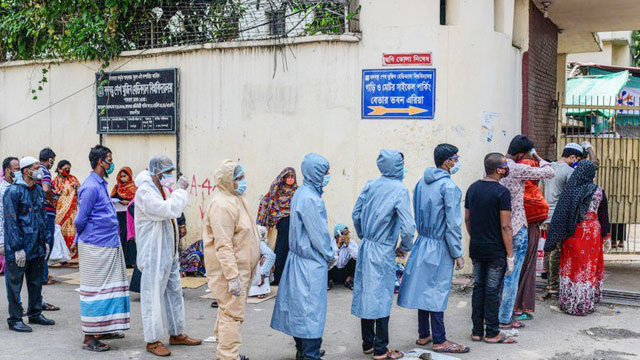A team comprising academics and professionals has alleged that widespread human rights violations were taking place in the country amid the ongoing Covid-19 pandemic.
It came up with the allegation in a report circulated to the media yesterday. The report was prepared analysing reports of 19 newspapers and five television channels run between April 11 and May 31.
The team members include photojournalist Shahidul Alam, Supreme Court lawyer Jyotirmoy Barua, women's rights activist Farida Akhter, independent researchers Saydia Gulrukh, Rezaur Rahman Lenin and Chittagong University Assistant Professor Maidul Islam.
"At least 122 people from 41 districts died allegedly without treatment. The deaths can be attributed to four broad causes: hospitals not admitting patients, not getting treatment after admission, negligence by the management, and obstructions to treatment by relatives, community members and neighbours," said the report.
"On April 24, an indigenous woman named Ronika Chakma died in labour allegedly when the launch which was taking her to a hospital in Rangamati was stopped at 3:15am for over 45 minutes by law enforcers for a search. The launch was only let go when Ronika Chakma's condition deteriorated badly. She and her unborn baby died when they were taken to a hospital," it said.
Frontline health workers are the worst-hit amid the crisis because they do not have adequate access to health safety measures. They have also been restricted from talking to the media, said the report, detailing a list of incidents where health workers were penalised for speaking out.
The report presented a holistic picture of the plight of workers from all sectors. "Between February and May 20, garments workers staged demonstrations almost every day for their wages. On the other hand, entire neighbourhoods and residences were put under lockdown … No factory was locked down, even though 97 RMG workers had tested coronavirus positive until May 7, 2020," it said.
"Labour organisers in Ashulia alleged that they received phone calls from law enforcers warning them not to write anything on social media regarding unpaid wages," the report stated. It said five labour leaders were taken to the Ashulia industrial police lines in May, were interrogated throughout the day, and released only upon signing an agreement swearing that they would not write anything on their social media accounts.
Meanwhile in Moulvibazar's Kulaura, tea workers who only earn Tk 102 per day to begin with, had not been getting paid for 12 weeks, mentioned the report. "The full-time staffers of a tea garden have not been getting paid for 11 months either."
Transport workers have been going hungry as well, in spite of paying "fees" to different societies and associations throughout the year, the report stated. "Around 70 lakh transport workers are in peril, even though there are 300 associations whose yearly earnings from "fees" is Tk 2,000 crore.
"The workers' welfare foundation collected Tk 400 crore from the transport workers over the years, but that money cannot be used because the labour and welfare ministry said there is no legal scope to spend it for relief works."
On April 16, thousands of indigenous workers trying to go back home after the lockdown left them unemployed, were stopped at the Khagrachhari-Fatikchhari border by law enforcers, the report noted. "Most of those stopped were women. The police charged at them with batons, grievously injuring five, of whom four were women."
Private university teachers are not being paid properly either, the report said. "Only 32 of 96 private universities paid their staff in full in April."
The report also noted that in such a situation, relief is far and few in between. "Between March 29 and April 28, there were 12 protest programmes for relief in Jashore, 11 in Dhaka, 9 in Chattogram, 8 in Rangpur, 7 in Nilphamari, 7 in Gaibandha, 6 in Pabna, 6 in Rajshahi, 5 in Lalmonirhat, 5 in Sirajganj, 4 in Jamalpur, 4 in Panchagarh, 4 in Dinajpur, 4 in Thakurgaon and 4 protests in Barisal."
The plight of migrant workers also featured in the report. "The sudden loss of jobs and inability to send money home affected the well-being of migrant workers. A Kuwaiti newspaper reported that at least nine migrant workers died by suicide and four attempted it.".





